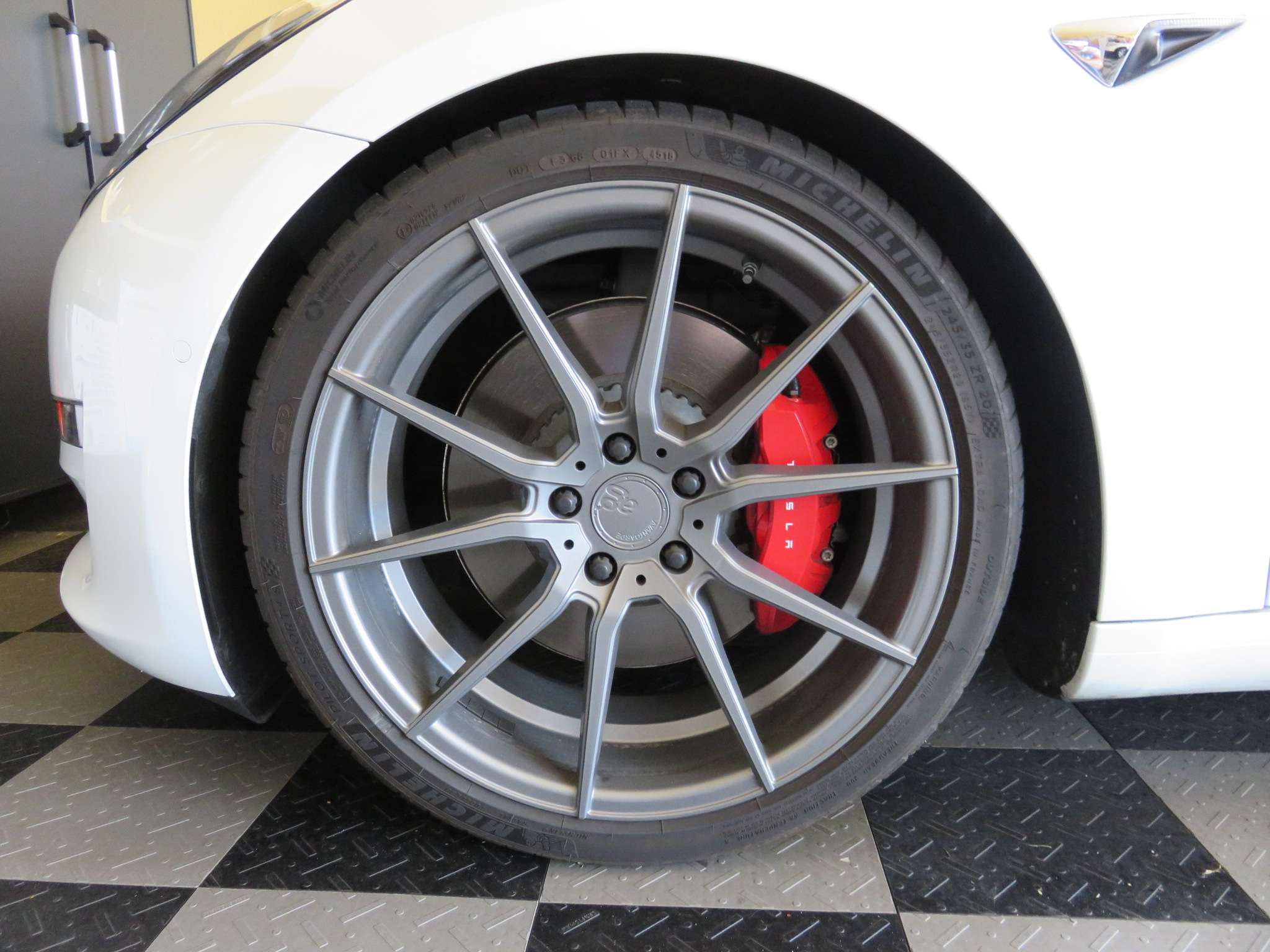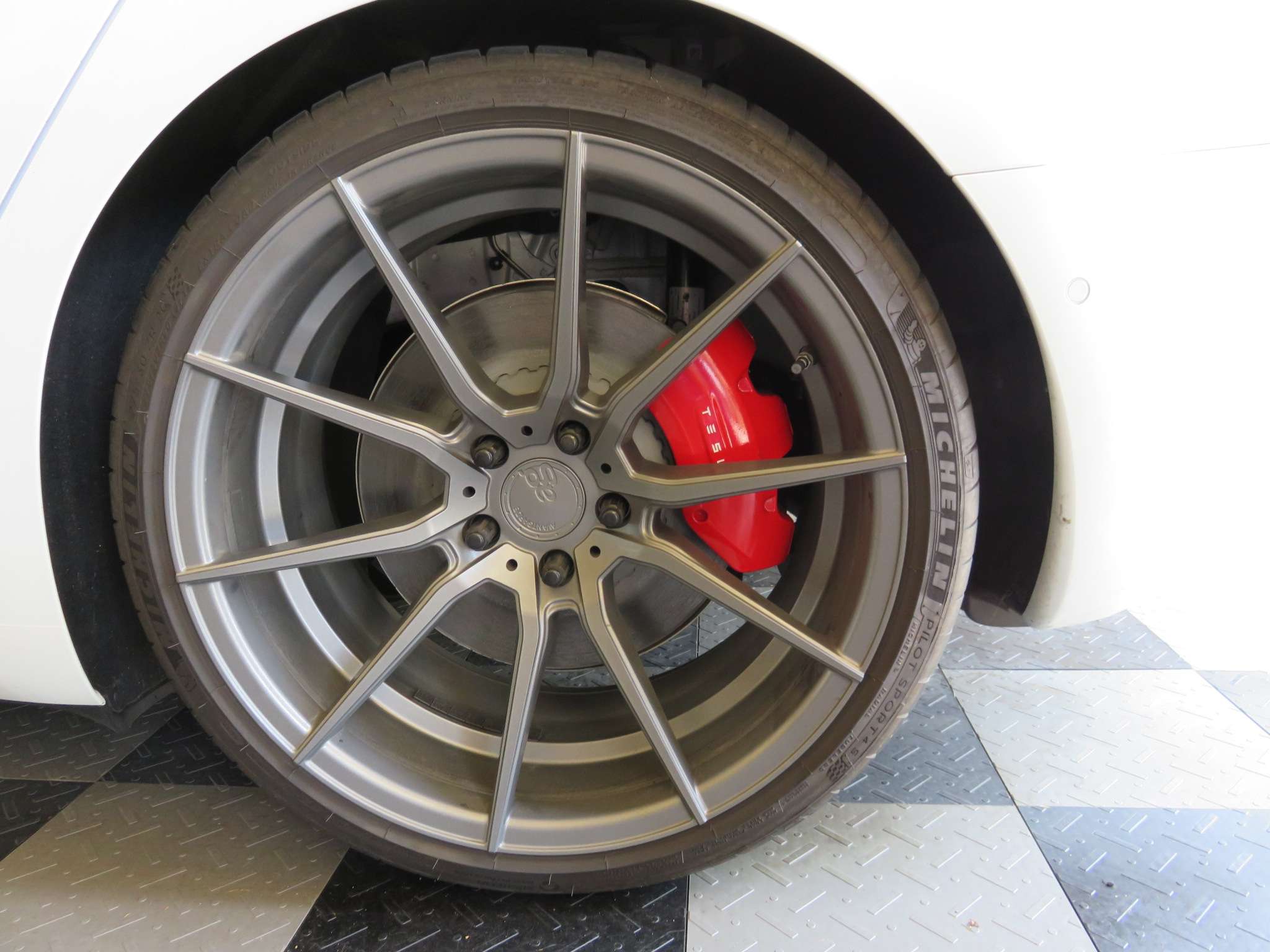Msjulie
Active Member
I thought the actual caliper that was tightest in clearance was the rear caliper... are you getting it for increased thermal capacity or?
You can install our site as a web app on your iOS device by utilizing the Add to Home Screen feature in Safari. Please see this thread for more details on this.
Note: This feature may not be available in some browsers.
If its just the look you are after, why not paint them and save the money for a proper BBK on the front? You can get the Tesla logo and everything in them.Now that I have the new wheels they are begging for red calipers. I just bought new wheels and they are begging for red brake calipers.
You better take that back or NightStalker will come after you with his "stopping power is 100% all tires and has nothing to do with rotors/pad" talk!!!!....
If making emergency stops from high speeds, better brakes shed speed faster.
At both low and high speeds, reaction time is also huge factor
Or course, it depends on the speed.
If making emergency stops from high speeds, better brakes shed speed faster.
That's assuming you are at locking threshold at all speeds. That is certainly not the case at high speeds where the clamping pressure and surface area can greatly increase clamping force. You mention "legal" speeds but I'm not even sure if ABS were turned off if braking is at locking threshold for all tire possibilities, especially the PS4s. Sure, at lower speeds I agree with you, but not higher.Stock brakes will stop the car in exactly the same time/distance as the most fancy expensive upgraded brakes you can find for a single panic stop from any legal speed.
That's assuming you are at locking threshold at all speeds. That is certainly not the case at high speeds where the clamping pressure and surface area can greatly increase clamping force
. You mention "legal" speeds but I'm not even sure if ABS were turned off if braking is at locking threshold for all tire possibilities, especially the PS4s.
Sure, at lower speeds I agree with you, but not higher.
@Knightshade, All I'm tryin to make clear is it's a matter of brake torque. BBKs provide increased clamping force by apply more torque to the car which will lead to shorter stopping distances *only* if that torque is still less than the torque required to overcome the tire friction to the road, in other words, the torque required to lock the wheels in the absence of ABS.
Guy who designs braking systems for a living and both writes books on and teaches SAE master classes on the topic said:Remember: Bigger calipers don't create any more "stopping power" and they do not "decrease stopping distance"--they just generate higher clamp loads for a given pressure input
Let's say we had no ABS....If the standard brakes produce enough torque to lock the brakes at 80mph (the maximum here in the US), then yes..,.BBK do nothing at legal speeds.
If the standard brakes don't lock at 80mph but do end up locking at a lesser speed, say 35 mph, then increasing the brake torque from 80 mph to 35 mph will result in a quicker stopping distance during that interval only.
The quickest stopping distance will be achieved with the brake torque *just* under the tire friction limit.
Once the ABS is dong it's thing (which means braking torque exceeds tire friction)...I agree BBK do nothing.
I just don't know what speed that starts to happen (and it will be different depending on car as it depends on speed and tires as well as suspension condition).
I’m not sure this is true but I have nothing definitive to back this up, especially with stickier tires. You have any reference for this statement?But the point is the stock brakes (on the Model 3, and pretty much every production car in the last decade or two at least) do have enough force to lock the wheels in the absence of ABS at any legal speed
Don’t worry about ABS then. I still think you are missing my point.
We differ in your following statement;
I’m not sure this is true but I have nothing definitive to back this up, especially with stickier tires. You have any reference for this statement?
Brembo said:an increase in braking power will do nothing to stop the vehicle in a shorter distance.
Hi all, I am very happy to have finally discovered this thread I have been searching for. I will add a post at the end with pics, but answering question here: Yes, the rear brake rotors on the Performance model and non-performance model are the same dimension (diameter). They may be identical, but I don't know that for a fact. You can find the dimensions on page 162 of your owner's manual. 335mmX20mm thick.Ok, odd question. If I buy used Model 3 performance rear brake calipers, will they work with the non performance rotors? My long term plan is to upgrade the rotors (perhaps Mountain Pass). Like you Mac, I didn't love the 19s and 20s that Tesla offers, so waited to do my own upgrade. Now that I have the new wheels they are begging for red calipers. I just bought new wheels and they are begging for red brake calipers. I was thinking of painting the front ones and replacing the back with used Model 3 performance as a medium term fix until I'm ready for another big hit to upgrade the rotors. Here's the new wheels. View attachment 458347
Hmmm...good question! Anyone know the answer?Nice upgrade! Someone has to do it first so others can learn.
Do we not think the performance brakes also include an upgraded master cylinder?
You are both right! At typical use driving speeds, the standard model 3 brakes will achieve locking threshold. I take my AWD DM to the track and mountain roads. Stock brakes fade after just a few threshold braking efforts. Very noticeable and results in extremely mushy pedal feel and unsafe perception. I have a track day scheduled in two weeks and will report back the comparison to the stock brakes. Last time out, after the first top speed (around 120MPH) to 40MPH corner, the brake overheat indicator flashed and beeped and worried me enough I barely touched brakes after that. My initial street tests seem to indicate much less effort and far better feel in achieving locking threshold.That's assuming you are at locking threshold at all speeds. That is certainly not the case at high speeds where the clamping pressure and surface area can greatly increase clamping force. You mention "legal" speeds but I'm not even sure if ABS were turned off if braking is at locking threshold for all tire possibilities, especially the PS4s. Sure, at lower speeds I agree with you, but not higher.
I can see you have the Performance rotor on the front. Did you also swap out the rear rotors? Did you notice any difference in dimensions?@Ebrake...looking good....now you need to replace those wheels....
Wow you got great price on those calipers on ebay!...I paid a lot more but my rears were new and fronts had 2K miles on them so pretty new.




